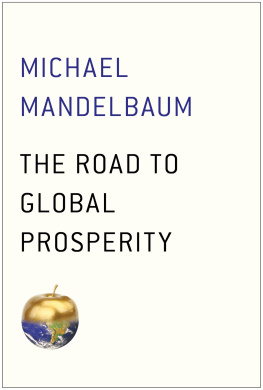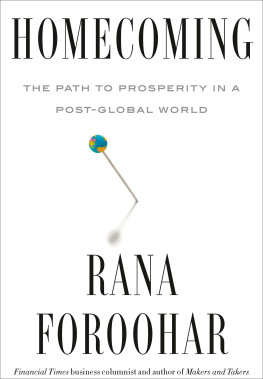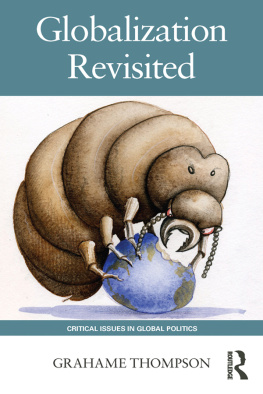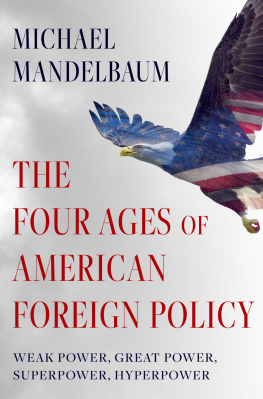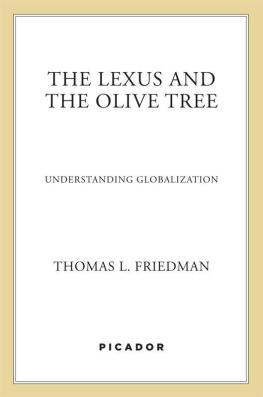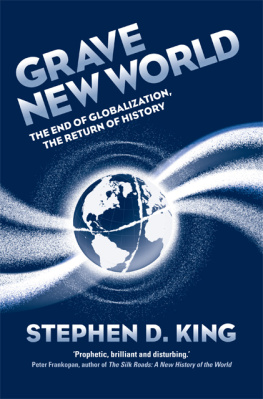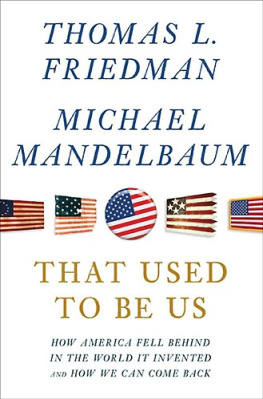
ALSO BY MICHAEL MANDELBAUM
That Used to Be Us: How America Fell Behind in the World It Invented and How We Can Come Back (with Thomas L. Friedman)
The Frugal Superpower: Americas Global Leadership in a Cash-Strapped Era
Democracys Good Name: The Rise and Risks of the Worlds Most Popular Form of Government
The Case for Goliath: How America Acts as the Worlds Government in the Twenty-first Century
The Meaning of Sports: Why Americans Watch Baseball, Football, and Basketball and What They See When They Do
The Ideas That Conquered the World: Peace, Democracy, and Free Markets in the Twenty-first Century
The Dawn of Peace in Europe
The Global Rivals (with Seweryn Bialer)
The Fate of Nations: The Search for National Security in the Nineteenth and Twentieth Centuries
Reagan and Gorbachev (with Strobe Talbott)
The Nuclear Future
The Nuclear Revolution: International Politics Before and After Hiroshima
The Nuclear Question: The United States and Nuclear Weapons, 19461976

Simon & Schuster
1230 Avenue of the Americas
New York, NY 10020
www.SimonandSchuster.com
Copyright 2014 by Michael Mandelbaum
All rights reserved, including the right to reproduce this book or portions thereof in any form whatsoever. For information address Simon & Schuster Subsidiary Rights Department, 1230 Avenue of the Americas, New York, NY 10020.
First Simon & Schuster hardcover edition March 2014
SIMON & SCHUSTER and colophon are registered trademarks of Simon & Schuster, Inc.
For information about special discounts for bulk purchases, please contact Simon & Schuster Special Sales at 1-866-506-1949 or business@simonandschuster.com.
The Simon & Schuster Speakers Bureau can bring authors to your live event. For more information or to book an event contact the Simon & Schuster Speakers Bureau at 1-866-248-3049 or visit our website at www.simonspeakers.com.
Interior design by Akasha Archer
Jacket design by Tom McKeveny
Jacket photographs: globe pavilalistock;
golden apple Ragnarock/Shutterstock
Library of Congress Cataloging-in-Publication Data
Mandelbaum, Michael.
The road to global prosperity / Michael Mandelbaum.
First Simon & Schuster hardcover ed.
pages cm
1. Capitalism 2. International trade. 3. International economic relations.
4. Economic development 5. Financial crises. I. Title
HB501.M31364 2014
337dc23
ISBN 978-1-4767-5001-9
ISBN 978-1-4767-5003-3 (ebook)
To Robert J. Lieber, Charles H. Lipson, Rajan Menon, and Michael B. Oren: gentlemen and scholars;
and to Anne Mandelbaum, with my love and admiration
ACKNOWLEDGMENTS
I owe a debt of gratitude in the writing of this book to my home institution, The Johns Hopkins University School of Advanced International Studies, where I have taught since 1990. Its curriculum emphasizes economics, and graduating students take an oral examination in two fields: the one in which they have concentrated and international economics. I have therefore taken part, with a number of economist colleagues as the other examiner, in many such examinations, which contributed to this book in two ways: first, they encouraged my long-standing interest in economics and inspired me to learn more on my own by reading what economists write, particularly for noneconomists; second, what I heard in those examinations inspired the convictionwhich reading and discussions deepened and which is a major theme of The Road to Global Prosperity that at the root of the major economic issues the world will face in the years ahead lie political considerations.
I am immensely grateful to my stellar agent, Esther Newberg of International Creative Management, whose encouragement, unerring judgment, and wise counsel make her all an author could wish a literary agent to be. It has been a privilege to work with my editor at Simon & Schuster, Alice Mayhew, and her colleague Jonathan Cox, whose editorial suggestions improved this book in significant ways.
I am indebted to Thomas L. Friedman of The New York Times for many conversations on the subjects covered in these pages.
I am most deeply grateful of all to my wife, Anne Mandelbaum, for her astute advice and for the sustenance I draw upon daily from her unwavering support, her uncommon sense, her wit, and her love.
CONTENTS
CHAPTER THREE: THE RIVER
Economics may propose but politics dispose.
M ARTIN W OLF
INTRODUCTION
A single headline rarely signals a dramatic change in the history of the world, but Time magazines February 15, 1999, cover did exactly that. It showed three American economic officialsAlan Greenspan, chairman of the Federal Reserve Board, and Secretary of the Treasury Robert Rubin and his deputy secretary Lawrence Summerswith a bright yellow headline calling them The Committee to Save the World. The accompanying story described their efforts to keep the ongoing financial crisis in Asia from worsening and spreading around the globe.
In the past, headlines about saving the world referred to political leaders grappling with issues of war and peace, not financial officials coping with markets. When the world needed saving, the threats came from the aggression of kings, emperors, and dictators, not from the weakness of national currencies under assault from investors and speculators.
By early 1999, however, things were different. The attention of national leaders had shifted to economic matters. As recently as 1971, when informed of the latest problems with the ever-volatile Italian currency, President Richard Nixon had responded, I dont give a shit about the lira. Four decades later, neither President Barack Obama nor any other national leader would have considered adopting Nixons view of the liras beleaguered successor, the euro. The difficulties of the European currency that threatened to plunge Europes economy into a severe downturn had the potential to drag the American and global economies down with it. Between 1971 and 2011 economic issuesabove all, the health of the global economyreplaced matters of war and peace as the major focus of national leaders because economic matters came to have greater effects on the countries they led.
At first, this shift seemed very good news indeed. In economics, unlike in war, everyone can be a winner; and from 1991 to 2008 virtually every country gained enormously from participating in the global economy. Then came the great financial crisis in September of that year and the deep, punishing global economic downturn that it triggered. These disasters gave rise to the impression that the days of worldwide economic growth had come to an end and that the results of the great shift from war to commerce were not destined to be as favorable as they had first seemed.
The message of this book is that this post-2008 impression is wrong. The global economy will continue to grow. Its growth will make people everywhere richer. While not inevitable, this is the likely future. Political obstacles stand in the way, as they always do; but they are likely to be circumvented or overcome, to the benefit of the vast majority of the worlds 7 billion inhabitants. Despite the economic disasters of the recent past, in the decades ahead most countries and most people most of the time will travel the road to global prosperity.
The rise of the international economy as the major influence on the future of nations and their governments and on the daily lives of people everywhere has four main causes. The first is the sharp decline in the importance of large-scale war. While armed conflict has not disappeared entirely, major conflicts, like the two world wars and the Cold War that followed, are now extremely unlikely.
Next page
